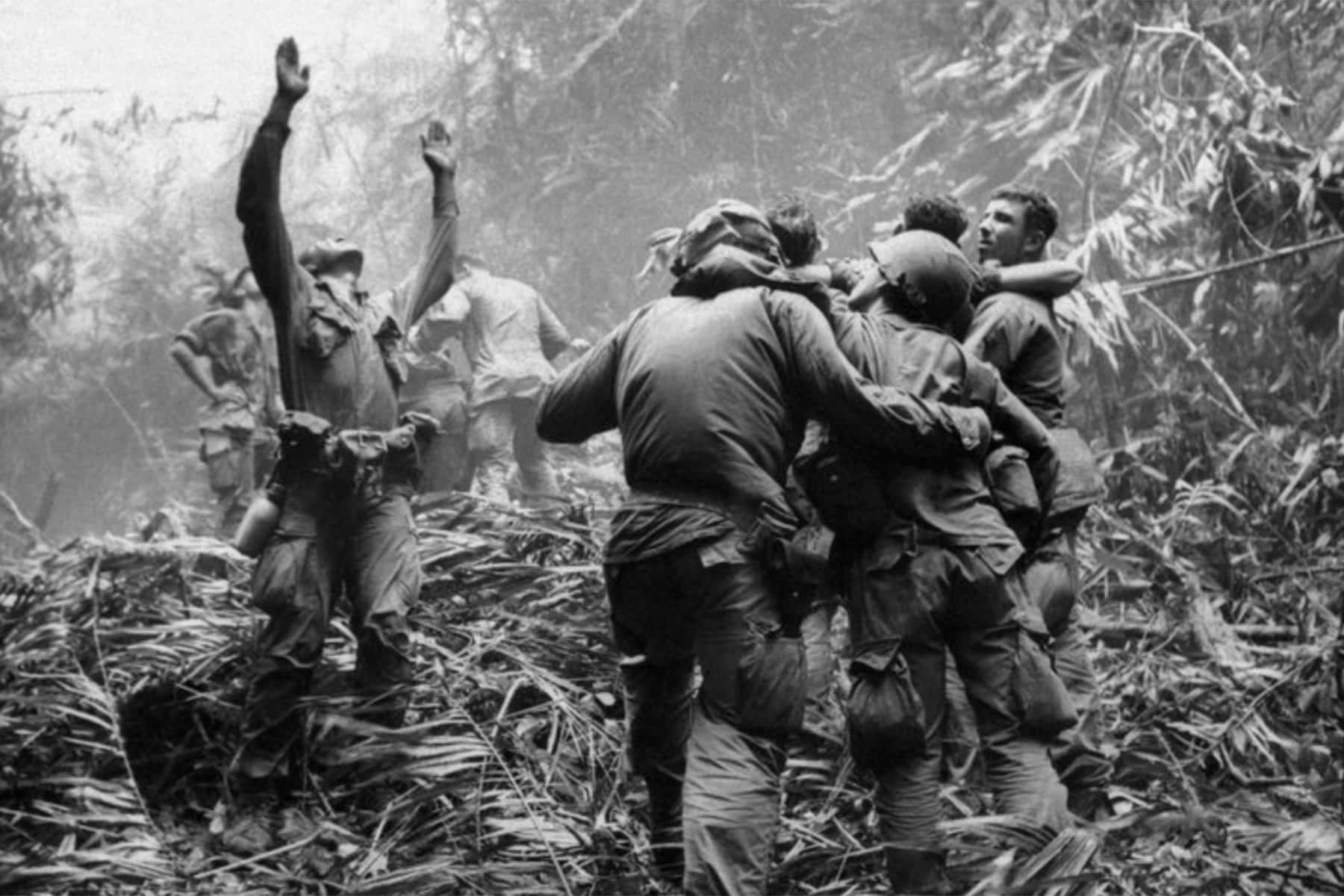
Vietnam became the Western world’s most divisive modern conflict, precipitating a battlefield humiliation for France in 1954, then a vastly greater one for the United States in 1975.
The newly published Vietnam: An Epic Tragedy, 1945-1975 is a masterly study by Max Hastings of the Vietnam war that unearths fresh testimonies and condemns both sides in the conflict. The author spent the past three years interviewing scores of participants on both sides, as well as researching a multitude of American and Vietnamese documents and memoirs, to create an epic narrative of an epic struggle.
He portrays the set pieces of Dienbienphu, the Tet offensive, the air blitz of North Vietnam, and less familiar battles such as the bloodbath at Daido, where a US Marine battalion was almost wiped out, together with extraordinary recollections of Ho Chi Minh’s warriors. Here are the vivid realities of strife amid jungle and paddies that killed 2 million people.
Many writers treat the war as a US tragedy, yet Hastings sees it as overwhelmingly that of the Vietnamese people, of whom forty died for every American. US blunders and atrocities were matched by those committed by their enemies. While all the world has seen the image of a screaming, naked girl seared by napalm, it forgets countless eviscerations, beheadings and murders carried out by the communists.
The people of both former Vietnams paid a bitter price for the Northern victory in privation and oppression. Here is testimony from Vietcong guerrillas, Southern paratroopers, Saigon bargirls, and Hanoi students alongside that of infantrymen from South Dakota, Marines from North Carolina, Huey pilots from Arkansas.
No past volume has blended a political and military narrative of the entire conflict with heart-stopping personal experiences, in the fashion that Max Hastings’ readers know so well. The author suggests that neither side deserved to win this struggle with so many lessons for the 21st century about the misuse of military might to confront intractable political and cultural challenges. He marshals testimony from warlords and peasants, statesmen and soldiers, to create an extraordinary record.
Max Hastings has been going to the wars for close on half a century. Fascinated since he was a boy by all things military, he has reported with distinction on many conflicts as well as writing as a historian about those that occurred before his time. It has been an obsession, but one that he has nurtured into a major talent. He has long since shed the romantic view of combat evident in his early book on Yoni Netanyahu, the hero of Entebbe, to arrive at a more complex understanding of war, the nature of soldiering and the limits of military force.
The Vietnam war so profoundly shaped the post-second world war era, gravely damaging a US that had previously had some claim to both moral and political world leadership. America’s fundamental mistake, as Hastings emphasizes, was to think that military strength, however great, could make up for political failure.
The anti-communist leanings of a substantial portion of the South’s population were not enough, in the absence of a worthwhile state, to ensure the survival of South Vietnam. The lessons of the war, needless to say, have been only half learned, not only by America but by a Russia that, in Afghanistan, repeated some of America’s Indochina mistakes, by a China even now holding down minorities by brute force and by a Vietnam still unable to fully relax its harsh grip on society.
Hastings himself said that “the literature of the Vietnam war is immense.” Why, then, add to it? It is a good question, but one to which his book provides a resounding answer. This is a work of considerable quality, marked by a possibly unique combination of military expertise, historical grasp and journalistic skill in unearthing hitherto undiscovered human stories of the war, as well as judiciously selecting from among others already known.
It helps, too, not to be an American, because that lends a certain useful distance. Hastings presents a vast panorama, admirably balanced and well managed, which does not neglect the geopolitical or the strategic but vividly brings home the reality of the war as experienced by individuals.
Those who figure include American officers and officials interviewed by Hastings, but also Russian air defense advisers, Chinese railway supervisors, British spies and Hollywood stars. Hastings expands the war’s cast to bring in some whose testimony has not previously been fully explored as well as some until now unrecorded. Many stories are of death, maiming, rape and destruction; others scalp-prickling tales of courage or cowardice under fire; others still of moments of decency and empathy.
There are also stories that express humor, as in the case of the South Vietnamese general who forgot to arrive in time for a planned coup, or that of the gourmet North Vietnamese colonel, sick of the privations of the Ho Chi Minh trail, who wrote more in his journal about rare good meals than he did about the hard fighting he endured.
Alongside these vignettes are accounts of battles, not only of the best-known encounters, but of engagements now barely remembered, which Hastings covers partly for that reason but also because they were symptomatic of what was wrong with the American way of war. At times, commanders exhibited, he writes, “folly of Crimean proportions.”
His judgment here is typical of the severity with which he deals with the stupidities, lies and crimes of everybody from the level of the White House and the Dragon Court, the north’s military headquarters, on down to US army lieutenants who would not come out of their bunkers or the Vietcong guerrilla who slit the throats of a family of nine, including six children.
It is a severity tempered with understanding, but Hastings makes even a reader familiar with these events grasp anew that it is entirely justified. This was a truly terrible war, marked from the outset by gross deceptions as well as daily cruelties. It was never more terrible and more shaming than in its last phase, when the Americans fought on, then encouraged their South Vietnamese allies to fight on, well knowing that the war was lost.
The obduracy of Le Duan, the dominant figure in the North Vietnamese leadership, clinging to the fantasy of a “general uprising” in the South and heedless of casualties as he ordered repeated general offensives, deserves condemnation. Yet the callousness of Nixon and Kissinger, presiding, as Hastings writes, over “gratuitous years of carnage, merely to conceal from the electorate, for their own partisan purpose, the inevitability of humiliation in Indochina,” seems worse.
Le Duan had an attainable objective, the independence of a united Vietnam. But the Americans had by that stage no purpose other than to distract attention from defeat at whatever cost in blood. It was a disgraceful end to an intervention conceived in ignorance, based on false premises and conducted with increasing disregard for reality on the ground. It is a very sad story and one that Hastings tells very well.
Martin Woollacott
HarperCollins
Portions of this article were published on The Guardian as Vietnam: An Epic Tragedy, 1945-1975 by Max Hastings – review
Help deliver the independent journalism that the world needs, make a contribution of support to The Guardian.














